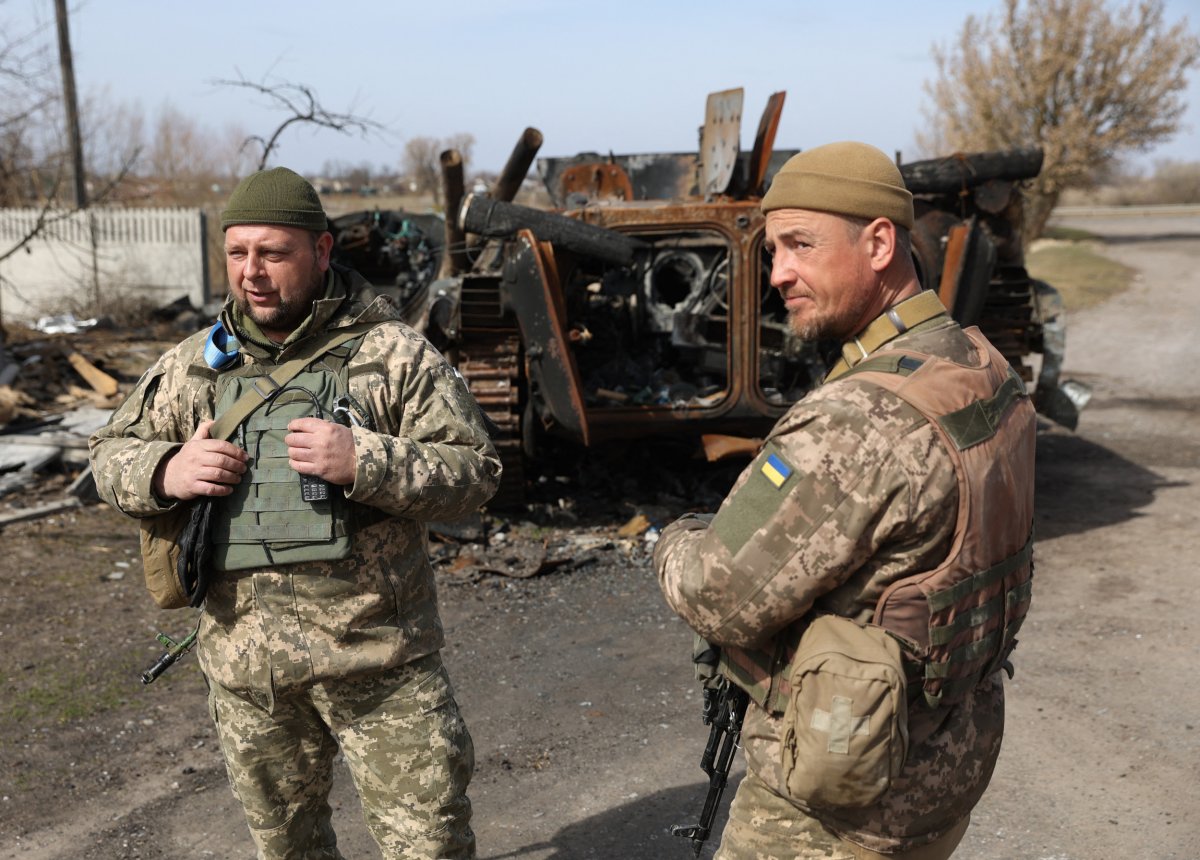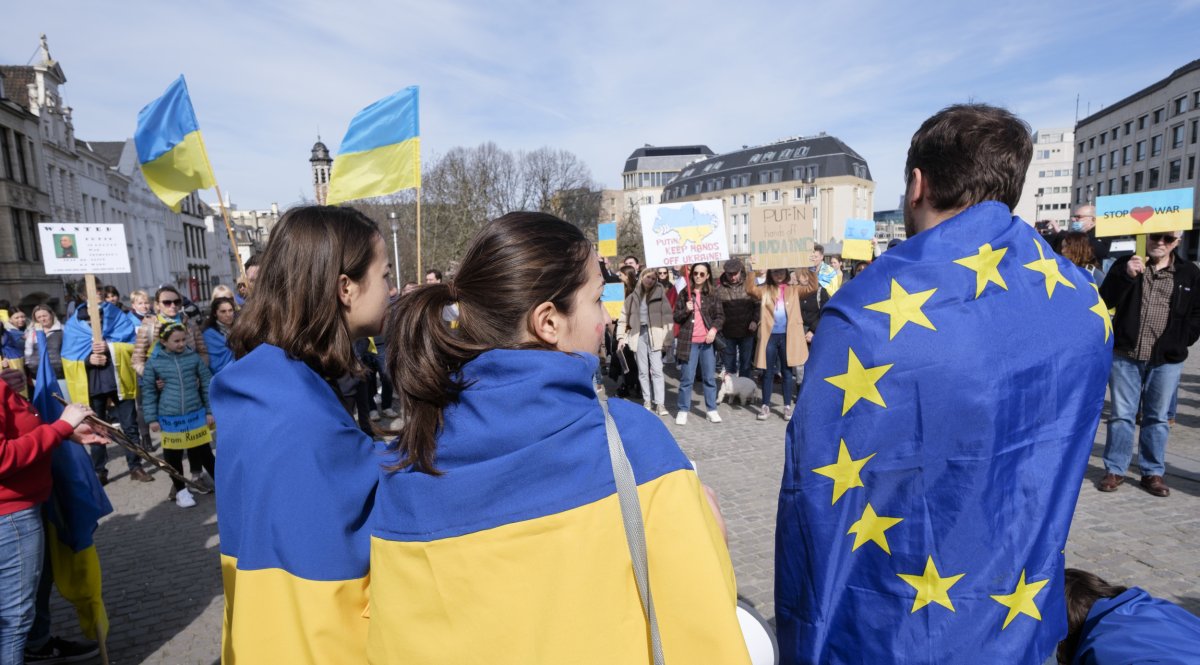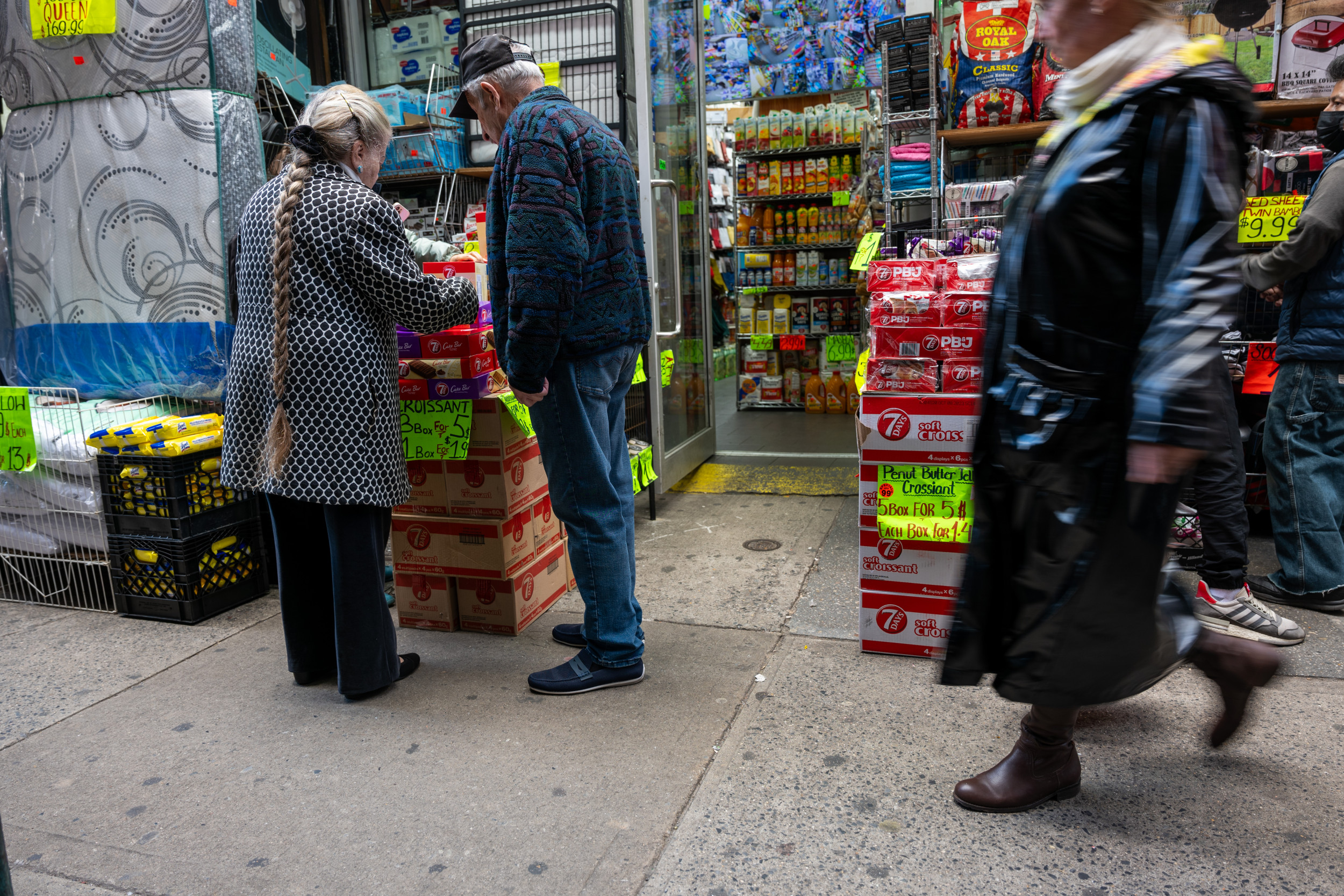Kosovo's Foreign Minister Donika Gervalla-Schwarz disputed Dutch Prime Minister Mark Rutte's warning that fast-tracking Ukraine's European Union membership would create frustration and instability in the Western Balkans.
Gervalla-Schwarz told Newsweek that Pristina "wholeheartedly" supports Kyiv's request for its EU bid to be accelerated, even as fierce fighting between Russian invaders and Ukrainian defenders stretches into its second month.
Rutte warned last week that an accelerated path for Ukraine might undermine stability in the Western Balkans. "There are countries who also want [accession]," Rutte said.
"EU accession is a process. There's no fast-track procedure for accession. If we were to do that, we would turn the accession process into a political process, and that shouldn't happen."
But Gervalla-Schwarz said Kosovo—recognized by Brussels as a potential candidate for EU accession—believes the bloc should adopt a new fast-track process and extend it not only to Ukraine, but to all Balkan nations who are committed to European integration.
"The current situation is very complex, and it is dangerous," she said. "That does not only apply to the situation in Eastern Europe and Ukraine, but moreover to the deteriorating situation in the Balkans.
"Therefore we are advocating to 'fast-track' not only Ukraine, but also Kosovo and other Balkan countries who are truly committed to EU principles.
"We do not only do that in our self-interest, but also in the interest of the EU itself: It's about preserving peace within the geography of the EU."
Gervalla-Schwarz said Kosovo is "constantly repeating that the EU can never be whole without the Western Balkans" and "convinced that the EU should be open for all European countries who are truly committed to EU values like democracy and rule of law."
"For us, the EU is first and foremost not an economic bloc but is the best European answer to securing peace. And Ukraine for sure is a part of Europe and deserves to be a future member of the European Union," she said.
'Early Warning' for EU, NATO

Gervalla-Schwarz told Newsweek earlier this month that the EU and its NATO allies—including the U.S.—must devote more attention to political tensions in the Western Balkans.
Kosovo, Bosnia and Herzegovina, and others have warned that Russia may open a second front against its Western adversaries in the region, perhaps facilitated by its Serbian partners.
"In the case of Kosovo, it is surely of utmost interest for the EU to secure peace before conflict has started," Gervalla-Schwarz said.
"With Ukraine, the EU made mistakes and did not take the right steps before the war broke out in order to support Ukraine sufficiently in preventing it.
"Too much appeasement encouraged the potential aggressor to become a real aggressor. That mistake should not be made twice. As Ukraine, Poland and our partners in the Baltics did, we are engaged in early warning."
Kosovo's foreign minister urged the EU and national governments "to recalibrate in order to avoid the next conflict."
"They need to do something which they do not like to do: they need to listen instead of talking first. They need to coordinate, with Ukraine and with us," she said.
"The world is not as some bureaucrats in Brussels or some diplomats are painting it for themselves, the world is a much different, and more dangerous place. Everybody should have learned that, hopefully in order to prevent the next conflicts."
Kosovo declared independence from Serbia in 2008, and ever since has been stuck in a tense diplomatic confrontation with its northern neighbor. At times, this has even threatened to erupt into renewed conflict.
Serbia is also bidding to join the EU, and along with Montenegro is the most advanced in the ascension process of all West Balkan nations. But Belgrade's traditional ties with Moscow have unsettled some. President Alexander Vucic's decision not to join the West's sanctions offensive on Russia has only deepened concerns over where Belgrade's loyalties lie.
Kosovo leaders have repeatedly accused Serbia of intentionally undermining Western unity. Belgrade, they say, could yet become a Russian Trojan Horse inside the EU.
Serbia's Foreign Ministry has repeatedly dismissed such concerns. Deputy Foreign Minister Nemanja Starovic told Newsweek earlier this month that such an allegation is a "deliberate distortion aimed at achieving some short-term political goals."
Belgrade, Starovic said, fully supports Ukraine's bid to join the EU. "Recent tragic events in Ukraine only highlight the need for the EU enlargement in our region to gain momentum," he explained.
Gervalla-Schwarz, however, urged officials in Brussels to be alert and skeptical: "From what we can see, can read, and what we get in reports from our contacts in—and our close observation of—Serbia, we are constantly warning the bureaucrats in distant Brussels and diplomats in the capitals of the EU and NATO that we know a lot of things much better because we are much closer.
"What for them might be only a diplomatic problem could turn out for us to be an existential threat to our citizens."
The foreign minister rejected Rutte's warning of frustration and instability if Ukraine's EU membership was accelerated. "We would not only not be frustrated, but would be very glad if EU partners would swiftly take on this historic challenge," she said.
"The EU needs...to acknowledge the new reality much quicker and more profoundly in order to stabilize the situation and set a clear perspective for the new European order of peace.
"Europe needs to act in order to provide not only stability, but also to guarantee sovereignty, democracy, the rule of law, territorial integrity and borders as basic principles in Europe and beyond."

NATO Fast-Track
Kosovo has already requested its NATO membership application be fast-tracked, and for the alliance to establish a permanent military presence in the country. Serbia has warned that such a move could prompt further regional conflict.
Five EU members still do not recognize Kosovo—Spain, Slovakia, Greece, Romania, and Cyprus. Until they do, Kosovo cannot join the bloc. All but Cyprus are NATO members, which will also block Pristina's ambitions to join the alliance.
"We are increasing our efforts to speed up our membership for the EU and NATO, but at the same time to convince the five remaining EU partners to follow the vast majority within the EU and to quickly put an end to the insecurity in southeast Europe by recognizing the borders of our country," Gervalla-Schwarz said.
"That would send a strong signal not only to Vucic but also to [Russian President Vladimir] Putin that questioning, or even violating, borders and sovereignty is simply a no-go in politics," Gervall-Schwarz added, describing the Russian president as a "war criminal."
"As long as Vucic and Putin can count on the fact that the EU remains divided and does not close that chapter, every contested border in Europe will continue to pose a risk not only of provocation but moreover of violent action and even war.
"Our people are truly European, and we do sincerely believe that the EU is the historic answer to ending wars on our continent, as it has proven with Germany and France and many other historic examples."
Ukraine Parallels With Kosovo
Ukraine's successful defense has inspired nations around the world. President Volodymyr Zelensky has become a national hero among Ukrainians and a resistance symbol for foreigners.
Gervalla-Schwarz said Kosovo sees parallels with Ukraine's history and current situation. "Like the Ukrainian identity has been fostered by a brutal war against a peaceful and democratic neighbor, the case of Kosovo is closed for any changes," she said.
"But stating the obvious, it is necessary for everybody to signal to the renegades that there is no chance to open Pandora's box again.
"The situation of Ukraine, which has been brutally attacked by its aggressive neighbor in the north, is remarkably similar to the situation of Kosovo, which was attacked by its neighbor in the north as well," Gervalla-Schwarz said, referring to the 1998 Kosovo War between Kosovo separatists and the former Yugoslavia (since broken up into Serbia and Montenegro)
"As we have defended our country and our people with all available means back in the 1990s, today we admire the courage and the civility of the Ukrainian people and the Ukrainian leadership very much.
"So there is no frustration, but only respect and admiration. We hope that Europe will understand what is necessary to do now, for both Ukraine and southeast Europe."
Uncommon Knowledge
Newsweek is committed to challenging conventional wisdom and finding connections in the search for common ground.
Newsweek is committed to challenging conventional wisdom and finding connections in the search for common ground.
About the writer
David Brennan is Newsweek's Diplomatic Correspondent covering world politics and conflicts from London with a focus on NATO, the European ... Read more
To read how Newsweek uses AI as a newsroom tool, Click here.






